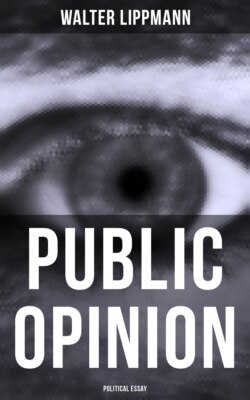Читать книгу Public Opinion: Political Essay - Walter Lippmann - Страница 27
На сайте Литреса книга снята с продажи.
3
ОглавлениеThe power to dissociate superficial analogies, attend to differences and appreciate variety is lucidity of mind. It is a relative faculty. Yet the differences in lucidity are extensive, say as between a newly born infant and a botanist examining a flower. To the infant there is precious little difference between his own toes, his father's watch, the lamp on the table, the moon in the sky, and a nice bright yellow edition of Guy de Maupassant. To many a member of the Union League Club there is no remarkable difference between a Democrat, a Socialist, an anarchist, and a burglar, while to a highly sophisticated anarchist there is a whole universe of difference between Bakunin, Tolstoi, and Kropotkin. These examples show how difficult it might be to secure a sound public opinion about de Maupassant among babies, or about Democrats in the Union League Club.
A man who merely rides in other people's automobiles may not rise to finer discrimination than between a Ford, a taxicab, and an automobile. But let that same man own a car and drive it, let him, as the psychoanalysts would say, project his libido upon automobiles, and he will describe a difference in carburetors by looking at the rear end of a car a city block away. That is why it is often such a relief when the talk turns from "general topics" to a man's own hobby. It is like turning from the landscape in the parlor to the ploughed field outdoors. It is a return to the three dimensional world, after a sojourn in the painter's portrayal of his own emotional response to his own inattentive memory of what he imagines he ought to have seen.
We easily identify, says Ferenczi, two only partially similar things:35 the child more easily than the adult, the primitive or arrested mind more readily than the mature. As it first appears in the child, consciousness seems to be an unmanageable mixture of sensations. The child has no sense of time, and almost none of space, it reaches for the chandelier with the same confidence that it reaches for its mother's breast, and at first with almost the same expectation. Only very gradually does function define itself. To complete inexperience this is a coherent and undifferentiated world, in which, as someone has said of a school of philosophers, all facts are born free and equal. Those facts which belong together in the world have not yet been separated from those which happen to lie side by side in the stream of consciousness.
At first, says Ferenczi, the baby gets some of the things it wants by crying for them. This is "the period of magical hallucinatory omnipotence." In its second phase the child points to the things it wants, and they are given to it. "Omnipotence by the help of magic gestures." Later, the child learns to talk, asks for what it wishes, and is partially successful. "The period of magic thoughts and magic words." Each phase may persist for certain situations, though overlaid and only visible at times, as for example, in the little harmless superstitions from which few of us are wholly free. In each phase, partial success tends to confirm that way of acting, while failure tends to stimulate the development of another. Many individuals, parties, and even nations, rarely appear to transcend the magical organization of experience. But in the more advanced sections of the most advanced peoples, trial and error after repeated failure has led to the invention of a new principle. The moon, they learn, is not moved by baying at it. Crops are not raised from the soil by spring festivals or Republican majorities, but by sunlight, moisture, seeds, fertilizer, and cultivation.36
Allowing for the purely schematic value of Ferenczi's categories of response, the quality which we note as critical is the power to discriminate among crude perceptions and vague analogies. This power has been studied under laboratory conditions.37 The Zurich Association Studies indicate clearly that slight mental fatigue, an inner disturbance of attention or an external distraction, tend to "flatten" the quality of the response. An example of the very "flat" type is the clang association (cat-hat), a reaction to the sound and not to the sense of the stimulant word. One test, for example, shows a 9% increase of clang in the second series of a hundred reactions. Now the clang is almost a repetition, a very primitive form of analogy.
